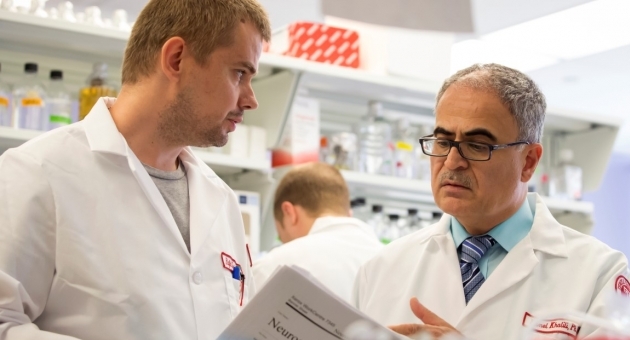
How cocaine and HIV-1 interact to cause brain impairment in patients infected with the human immunodeficiency virus will be the focus of a five-year, $7.4 million National Institute on Drug Abuse grant to Temple University School of Medicine researchers.
Kamel Khalili, chair of the Department of Neuroscience and director of Temple's Comprehensive NeuroAIDS Center, will lead a multidisciplinary team examining how cocaine worsens the neurological deficits that can plague HIV patients as they age.
Last summer, Khalili’s team demonstrated how stowaway HIV genes might be snipped from inside infected cells for good, an important step toward a cure for the virus. This grant reflects his continued focus on HIV-1.
"I have been interested in the central-nervous-system impact of HIV-1 since the very first days of the disease," said Khalili, a leader in the neurological aspects of HIV infection. "We realized that the impact is not as simple as the virus directly infecting neuronal cells, but rather a series of highly complicated events that lead to neuronal injury and death and ultimately dysregulated brain function."
HIV-1 cannot infect neurons, but previous research in Khalili's lab suggests that in the presence of cocaine, the virus triggers a series of actions and pathways that allow for the disruption of neuronal cell function and eventually culminate in neuronal cell death. When many neurons die, loss of brain function is inevitable, Khalili said.
Although this grant is directed toward untangling the complicated processes behind deterioration of central nervous system function in HIV-1, it ultimately may inform the discovery of future treatment for patients with neurocognitive disorders.
"This area of AIDS research is very novel, and we are just scratching the surface in terms of scientific information and knowledge," said Khalili. "Through this grant, we hope to answer several important questions that could help in the next phase for the development of therapeutic molecules.”
In addition to Khalili, the Temple team includes Shohreh Amini, professor of biology in the College of Science and Technology; Temple University School of Medicine’s Prasun Datta, assistant professor of neuroscience; John Elrod, assistant professor of pharmacology in the Center for Translational Medicine; Dianne Langford, associate professor of neuroscience; Madesh Muniswamy, associate professor in the Center for Translational Medicine; Jay Rappaport, professor of neuroscience; Ellen Unterwald, professor of pharmacology and director of the Center for Substance Abuse Research; Sara Jane Ward, research assistant professor at the Center for Substance Abuse Research; and Huaqing Zhao assistant professor at the Temple Clinical Research Institute.
Researchers from the Icahn School of Medicine at Mount Sinai and Johns Hopkins University School of Medicine will also collaborate on the project.